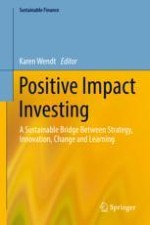
2018 | OriginalPaper | Buchkapitel
Positive Impact Investing: A New Paradigm for Future Oriented Leadership and Innovative Corporate Culture
verfasst von : Karen Wendt
Erschienen in: Positive Impact Investing
Aktivieren Sie unsere intelligente Suche, um passende Fachinhalte oder Patente zu finden.
Wählen Sie Textabschnitte aus um mit Künstlicher Intelligenz passenden Patente zu finden. powered by
Markieren Sie Textabschnitte, um KI-gestützt weitere passende Inhalte zu finden. powered by